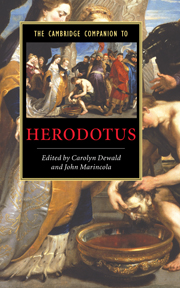Book contents
- Frontmatter
- Introduction
- 1 Herodotus and the poetry of the past
- 2 Herodotus and his prose predecessors
- 3 Herodotus and tragedy
- 4 The intellectual milieu of Herodotus
- 5 Meta-historiē: Method and genre in the Histories
- 6 The syntax of historiē: How Herodotus writes
- 7 Speech and narrative in the Histories
- 8 Herodotus, Sophocles and the woman who wanted her brother saved
- 9 Stories and storytelling in the Histories
- 10 Humour and danger in Herodotus
- 11 Location and dislocation in Herodotus
- 12 Herodotus and the natural world
- 13 Herodotus and Greek religion
- 14 Warfare in Herodotus
- 15 Herodotus, political history and political thought
- 16 Herodotus and the cities of mainland Greece
- 17 An alternate world: Herodotus and Italy
- 18 Herodotus and Persia
- 19 Herodotus and foreign lands
- 20 Herodotus' influence in antiquity
- Glossary
- Timeline
- Bibliography
- Index
- Series List
5 - Meta-historiē: Method and genre in the Histories
Published online by Cambridge University Press: 28 January 2007
- Frontmatter
- Introduction
- 1 Herodotus and the poetry of the past
- 2 Herodotus and his prose predecessors
- 3 Herodotus and tragedy
- 4 The intellectual milieu of Herodotus
- 5 Meta-historiē: Method and genre in the Histories
- 6 The syntax of historiē: How Herodotus writes
- 7 Speech and narrative in the Histories
- 8 Herodotus, Sophocles and the woman who wanted her brother saved
- 9 Stories and storytelling in the Histories
- 10 Humour and danger in Herodotus
- 11 Location and dislocation in Herodotus
- 12 Herodotus and the natural world
- 13 Herodotus and Greek religion
- 14 Warfare in Herodotus
- 15 Herodotus, political history and political thought
- 16 Herodotus and the cities of mainland Greece
- 17 An alternate world: Herodotus and Italy
- 18 Herodotus and Persia
- 19 Herodotus and foreign lands
- 20 Herodotus' influence in antiquity
- Glossary
- Timeline
- Bibliography
- Index
- Series List
Summary
Herodotus
In general, ancient historiography consists of extended narratives in the third person, with the author only rarely intruding in the first person. Herodotus' Histories, at the very dawn of ancient historiography, represent a conspicuous exception. The presence of Herodotus the narrator1 in his text is stressed almost continuously by the occurrence of statements in the first person. They range from the rather nondescript kind, such as 'Those of the barbarians who returned [from a raid against Delphi] said - as I have been told - that they had seen other divine signs besides these' (8.38), or 'I cannot write down exactly which of the Ionians were cowardly or brave in that naval battle' (6.14.1), to extremely specific ones, such as 'This is what I heard from the priests in Thebes' (2.55.1). At times, the Herodotean narrator intrudes in his text to express a judgement, and more often to formulate an opinion. Most of the time, however, he raises his voice, as in the examples above, to refer to the process of gathering information, with its successes and failures.
Especially to readers accustomed to modern historiography, it does not seem strange that a historian should spend time talking about his activity as a researcher. After all, one of the first things a history student is trained to do is precisely to buttress his or her every statement, in so far as it goes above absolute banality, with a reference, usually telling where the corresponding information comes from. However, seen against the background of common practice in ancient historiography, Herodotus' presence in his text is highly peculiar. Other ancient historians rarely dealt with the question of how they gathered information, usually confining it to preliminary statements at the beginning of their works.
- Type
- Chapter
- Information
- The Cambridge Companion to Herodotus , pp. 76 - 91Publisher: Cambridge University PressPrint publication year: 2006
- 27
- Cited by

